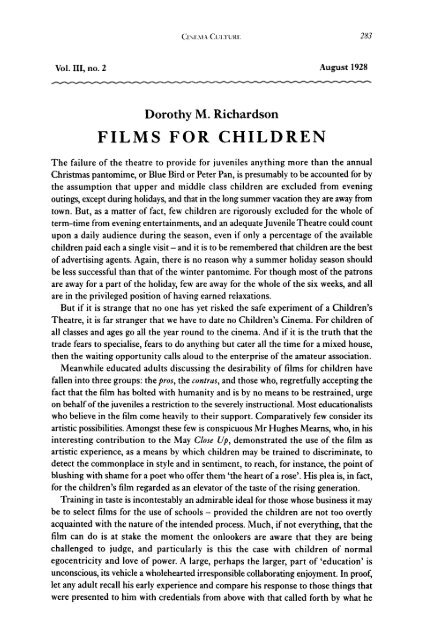close up - Monoskop
close up - Monoskop
close up - Monoskop
Create successful ePaper yourself
Turn your PDF publications into a flip-book with our unique Google optimized e-Paper software.
THI-; CONTRIBUTION OF H.D. 137<br />
but I can dare not question our cause for going to war. If I questioned it for one<br />
moment, I should go mad.' I did not say to her then, 'well, go mad.' I would now. I<br />
would say. 'If you haven't the courage and decency to face the thing straight now and<br />
for all time you don't deserve your sanity, and I hope you lose it.' None of us in the light<br />
of later events dare slur over our mentality for the sake of any personal fear of<br />
intellectual or physical consequences. I do not for one moment doubt the justice of<br />
England's heroic move in '14. But I will say then as now there was even among the<br />
most enlightened a tendency to scrap blindly brain for sentiment.<br />
Well... what is this anti-Russian feeling but a sentiment? What do you know of the<br />
revolution? What do you know of the Russians? Have you studied the Problem? Do<br />
you know how the 'workers' suffered? I do not mean that I in any way question the<br />
political justice, the rigid watchfulness of certain of the authorities here in England. The<br />
Great Strike and its dramatic denouement is still a matter of wonder and admiration<br />
among all political thinkers on the Continent. But the greatness of the Moscow art<br />
productions that it was my unique privilege to see last month in Berlin, puts the<br />
question of the Russian film (I speak naturally only of these real art productions) on a<br />
plane transcending politics. These films do not say to the British or the American<br />
workman, go and do likewise. They say look, we are your brothers, and this is how we<br />
suffered. The whole authoritative teaching of Potemkin, of Mother, of The End of Saint<br />
Petersburg, or Ten Days That Shook the World, are historical and almost religiously<br />
autochthonous character. There is no outward influence ... no passing to and fro of<br />
foreign soldiers, in Russia for and about and through and with the Russians. It is putting<br />
Russia (real Russia) on the map, not handing out the saccharine opera bouffe stuff that<br />
Hollywood offers us, for instance, in Greta Garbo's Karenina, or in the yet unreleased<br />
Feodora of Pola Negri.<br />
I do not say that Karenina and Feodora have no place in the scheme of things. They<br />
are both barley water, pink lemonade through a straw to quench naif palates on a hot<br />
day at the fair. They are not wine red or white, they are not even poison or raw spirits,<br />
and that perhaps is one of their great dangers. They are pleasant, skilfully photographed,<br />
both of the actresses in these two cases are women of talent and undoubted<br />
personality. But Madame Baranowskaja standing before the onrushing feet of the great<br />
stallions of the Czarist's imperial bodyguard is in another category altogether. She is<br />
a figure of tradition, historical, mystical, Biblical.<br />
The great horses rush forward. The crowds break before them. 'Mother' who has<br />
innocently given information concerning her own son (in this the unsuccessful pre-war<br />
abortive revolution) is left standing alone, clasping the discarded banner of her people<br />
... well that is all. The horses rush on across the iron bridge, and mother is left lying<br />
in the mud, clasping her riddled banner. Is this a 'red' flag in the sense of murder and<br />
outrage and insane threats of an illiterate gutter mob? That is what 'red' stands for to<br />
so many, many intelligent and educated people. The red flag of'mother' as she lies, a<br />
peasant woman, trampled to unsightly death at the frigid command of an aristocratic<br />
cavalry officer, is as red as any Flanders poppy. It is only one of the most crass illiteracy<br />
who could face the beauty of'mother' and remain untouched and unredeemed.<br />
So with Ten Days, so again with The End of Saint Petersburg. The teaching is a<br />
teaching of brotherhood, of equality in its most sane and stable form. We are hungry.

















